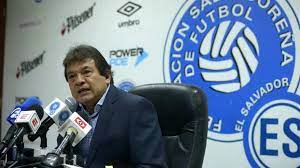August 17 –Salvadoran football is in crisis with FIFA having appointed a normalisation committee to run the administration of the Salvadoran Football Association (FESFUT) after government intervention removed president Hugo Carillio and the entire FESFUT executive committee.
In mid-July police on the instruction of the Attorney General’s Office raided FESFUT headquarters and Carillo’s home, searching for evidence of fraudulent administration and money laundering. Carillo, who has been president since 2018, is up for re-election next month, along with the rest of the executive committee.
At the time of the raids the FESFUT executive committee and its general secretary were suspended by the Sports Disciplinary, Ethics and Appeal Committee of the Instituto Nacional de los Deportes de El Salvador (INDES, the Salvadoran National Sports Institute).
Carillo (pictured) denies the accusations of fraud and money laundering saying that after the raid the police “withdrew quickly. They know my accounts because they have access to the financial system, I have not committed any crime.”
During World Cup qualification Carillo was confronted by national team players who refused to play against Canada unless they were paid their agreed fees. Carillo said that the situation was a misunderstanding and that there had never been any intention to withhold player payments. The game was played and the players were paid.
There have been signs that El Salvador’s government has ambition to take closer control over the running of the nation’s sport and moves had been made to take over the country’s Olympic Committee.
Rather than giving the government the opportunity to appoint officials to run the federation, FIFA has stepped in to run FESFUT’s daily affairs and organise elections for a new FESFUT president and executive committee for a four-year term. It is unclear whether Carillo will be cleared to run again but it seems unlikely that the government will allow it.
FIFA said that it would audit FESFUT’s finances to ensure good governance practices and that it would “establish an appropriate framework for the proper management of the development funds provided by FIFA and Concacaf, thus enabling their investment in the development of Salvadoran football.”
Crucially, El Salvador, who have been making performance improvements in Concacaf competitions, have not been banned from competition and will still have teams playing internationally. Even so, all matches in the Salvadoran Primera División, the country’s top professional league, have been suspended since last month because of the crisis at FESFUT.
The Salvadoran national team have taken some significant regional scalps and currently lead their Nations League group, a point ahead of the US.
Central to their performance has been coach Hugo Perez. Perez, who has was born in El Salvador but has dual US and Salvadoran nationality and played for the US, has built a senior team with a core of heritage players from the US, as well as seeding his U-20 team similarly. To maintain that progress the continued involvement of Perez looks to crucial.
El Salvador football is no stranger to crisis. In 2014 FIFA banned a total of 21 senior men’s players for match-fixing offences. In 2018 then national team manager Ramon Maradiaga was banned for failing to report an attempt at match-fixing within the senior team dressing room. He was succeeded by Perez.
Contact the writer of this story at moc.l1722055505labto1722055505ofdlr1722055505owedi1722055505sni@n1722055505osloh1722055505cin.l1722055505uap1722055505

